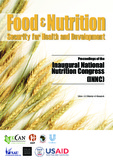| dc.description.abstract | partners to recognize the need for tangible support in capacity building
at institutions of higher learning for better nutrition in Africa.
Objective: To articulate the experience of capacity building in
nutrition in Africa using the Applied Nutrition Programme of University
of Nairobi as a case.
Design: Case study.
Setting: Applied Nutrition Programme, Department of Food
Technology and Nutrition University of Nairobi, Kenya
The Experiences: In response to lack of critical mass of qualified
nutrition professionals for effective mainstreaming of nutrition at community
and national levels in Africa, the Applied Nutrition Programme
of the University of Nairobi, since 1985, has been providing sound
nutrition training at postgraduate degree level, to international students;
mainly from Africa and with some from New Zealand, Sweden
and Brazil. The Programme also conducts capacity building in form of
short courses for Government Ministries, development partners and
communities and will be launching a BSc degree programme in nutrition
and dietetics this year (2005). The capacity building venture has
helped integrate regional indigenous nutrition knowledge and local
technologies with mainstream nutrition training, producing graduates
who know both their subject and field. The Programme has expanded
into nutrition in emergencies, interventions, dietetics, food as a human
rights and nutrition policy, inline with its goal of contributing to regional
development. Lack of consistent long-term funding is a major challenge.
Others include the rigid nature of donor funding, increasing
competition for students and delay, though in the phase-out, in timely
completion of the degree programme.
Conclusion: There is adequate demand for training and the
Programme has the potential to meet a substantial portion especially
if provided with the necessary support. The Programme is flexible and
vibrant in keeping with the dynamism that nutrition, health and development
challenges require. There is a need to define and impart a critical
portion of nutritional knowledge to all working in development in
Africa.
Recommendations: The nutrition fraternity must define a package
of critical nutrition knowledge for developmental communication,
increase opportunities for training and lobby for responsive policy and
partnership environment that supports all aspects of capacity building
including technical, infrastructure, information communication technology,
equipment and scholarships either in form of direct funding or
through commissioned assignments. | en |

